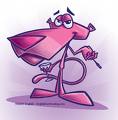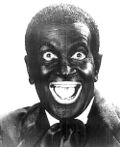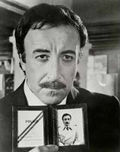Pink Panther Party
| Pink Panther Party | |||
|---|---|---|---|

| |||
| Foundation | Malcolm XXX | ||
| Political ideology | "Do it up against the wall, mother f*****s!" | ||
| Color(s) | Pink, obviously. Yay! | ||
The Pink Panther Party was a reinvention of the Black Panther Party, an attempt to reconcile the black separatism of the party with homosexual tendencies that were becoming more pronounced. The new name was an attempt to reach out to Negroes' gay inner selves.
History[edit | edit source]
Despite an outwardly macho culture, the link of American blacks to homosexuality has been pronounced since the beginning of the Black Power movement. The tendency achieved mainstream status when Malcolm XXX came to fame in black homosexual pornography and in fact invented the "blaxploitation" genre. In 1963, Martin Luther King aroused the crowd by famously noting, "I have a dream....that one day, we will be judged not by the content of our character but by the bulges in our pants." By 1966, fully three points of the "Ten-Point Program" of the Black Panther Party pertained to specific homosexual positions and related issues.
FBI Director J. Edgar Hoover's persecution of the Black Panthers famously included surveillance, infiltration, and (as claimed by Party members) assassination. But the Party was caught totally off guard in 1967 when Hoover himself paid his $10, got a Party membership card, and came to the National Convention in a fetching, checkered leisure suit.
The Black Panther Party began to break up in the early 1970s, as members openly disputed the Communist ideology of its leadership, and its meetings came to be dominated by white FBI agents, operating incognito with shoe polish on their faces and wearing stunning evening dresses.
Creation[edit | edit source]
In 1974, Bobby Seals and his suspiciously close friend Huey Newton decided the jig was up and the only way forward for the Black Panther Party was to reinvent itself with a new name that capitalized on the emerging homosexuality of American Negroes.
There were difficulties in this decision. The party had to drop its longstanding stand against police brutality, provided whips and restraints were used gently and there was a secret word that partners agreed would end the game; and to the classic uniform of blue shirts, black pants, black leather jackets, black berets, and openly displayed loaded shotguns, the leaders began to combine sashes and pink accents.
Despite the new name, the Pink Panther Party continued to be influenced by the writings of Mao Zedong, and outsiders routinely referred to members as "pinkos." But the homosexuality theme now competed with revolution for dominance. Huey Newton appeared in a famous bondage movie, playing the submissive role with fellow homosexuals Dewey and Louie, which led to street protests chanting, "Free Huey!"
At its apogee, the influence of the Pink Panther Party extended well beyond homosexual Negroes. Peter Sellers, who is neither, starred in a series of Pink Panther movies that popularized the leftist party for a new generation of theatergoers. Though the movies merely hinted at his relationship with nonwhite domestic "manservant" Kato, most showed them clowning around in bed together. As a tie-in to the movies, composer G.D. Lowe released a disco single of the theme song.
By 1992, during the Presidential election campaign of Bill Clinton, George H. W. Bush, and Ross Perot, the Pink Panther Party decided there was no longer a place in the American electoral process for a party having anything to do with ideology or beliefs--and even inappropriate promiscuity could not compete head-on with the Democrats--and it disbanded.
Legacy[edit | edit source]
Although the Party is now defunct, its legacy lives on, as even white U.S. Senators routinely solicit homosexual sex from undercover police in the bathrooms of international airports.


